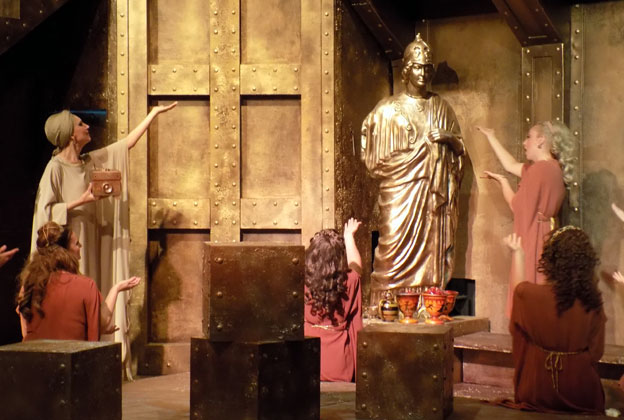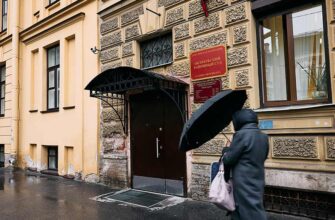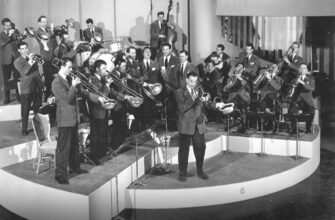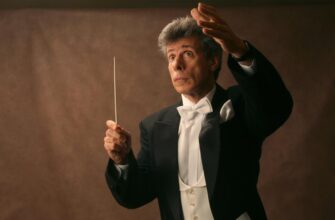Chamber Musical Theatre of B. Pokrovsky performed “Servilia”, opera of N. Rimsky-Korsakov, based on libretto of Lev Mey. The play was initiated by Gennady Rozhdestvensky, Music Director of the theatre, for his 85th anniversary.
The play was a gift not only for the outstanding conductor, but also for the audience, for the theatre and for everyone involved in the opera. The scene in Roman style, surrounding spectators, involves them in the space of the play, and makes a living witness of the vicissitudes of ancient history, which clearly show origins of spiritual challenges of our time.
In the original Roman and Greek theatres scenes are large and designed for a mass audience. The chamber atmosphere of B. Pokrovsky Theatre has its own charm. Greek dances, Roman soldiers with spears, and witchcrafts are in sight of the audience at arm’s length. So you are participator of the ancient entertainment, but also the witness of the catacombs and of Roman kangaroo court.
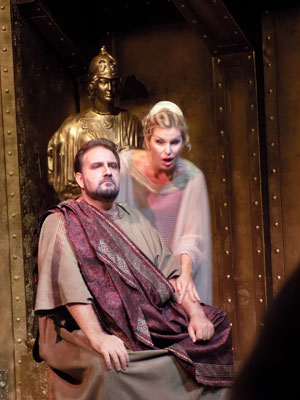
The actors play it with some special dynamics, as if they’ve been waiting for a long time for this show to demonstrate their professional skills. There are beautiful voices and high drama, and amazing music that tugged at your heartstrings.
The action of the Opera takes you back in the time of Nero, to 20 centuries ago. The last Roman Emperor from the house of Julio-Claudian – Nero Claudius Caesar ruled from 54 till 68 years, and became known in history as the personification of betrayal, luxury, and debauchery. He gave the order to kill his half-brother Britannic, his mother Agrippina, to exile and to kill Octavia (the first wife and sister). He killed a pregnant second wife Poppea by kicking in her stomach. A lover of Greek culture and theatrical shows, organizer of a public festivities Juvenal and Nerone, after the deposition of the Emperor he committed suicide at the age of 30 years, exclaiming: “What an artist dies!”. Among other atrocities, he is credited with were arson of Rome and blaming the Christians, which led them to a painful punishment.
Judgments about other aspects of the staging will be provided by the professional. We offer you remarks of Dmitry Kryukov, the conductor of the opera, given to us after the show. By the way, the orchestra is located so that the conductor stands sideways to the audience and becomes like one of the actors.
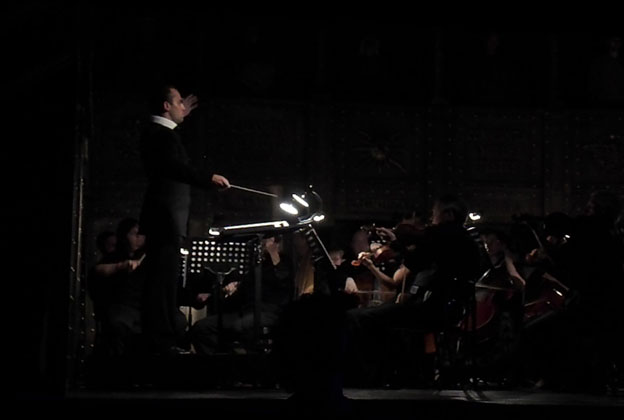
EV: Dmitry, in our day, Christianity is modified everywhere, shifted to social service which cares primarily about the fullness of the flock. That play is focused on another issue, which is now known only in narrow world: the courage and sacrifice of the early Christians, the persecutions against them.
D. Kryukov: The opera was staged 110 years ago, in life of N. Rimsky-Korsakov, but was canceled soon – and has not been played until now, with the exception of a concert performance with the deletions in Samara in the early 90s.
This stage is an initiative of Gennady Rozhdestvensky. The music of the opera is enormous, it contains a lot of musical and philosophical symbols.
The plot of the opera is a capacious and complex topic. The reason, why the opera was considered weak, was probably its dramatic composition. It was considered that the plot is poorly thought out, it is not clear for the audience. In our performance Servilia was poisoned, but according to Rimsky-Korsakov, she dies only from faith in Christ and from the love for Valery, as it seems to me, it could raise questions of the audience and critics. So dying from love, Servilia sees her living lover, but, nevertheless, it does not stop her death.
You said that Christian themes are not rised – I think that unfortunately people have forgotten that first of all opera is a play, a music, a thought, something that gives the opportunity to realize all the cross-dimensionality of problems.
EV: I believe it is a timely topic. And N. Rimsky-Korsakov addressed to the theme by definite reason. Is this an attempt to awaken the soul?
D. Kryukov: Probably, although I have not found direct statements in documents, that the composer was worried about exactly the problem of early Christianity. Actually, genius people, of course, consider more deeply issues of the meaning of art, its themes and influence on people.
EV: I have been looking at the audience today and I have seen that it is satisfied in the absence of obscene things, nudity or clowning. Maybe it is wrongly told that people need it? In order to verify this, we need the authority of G. Rozhdestvensky, who, in spite of any trends, made such a statement?
D. Kryukov: Certainly. Gennady N. Rozhdestvensky does it all his life.
Opera today has become pompous and expensive art, but, as it seems to me, it loses its sacred purpose. In our time, the repertoire of many sites has usually 10-15 most popular operas. And people, as it is common now to speak, come “to hear the singers”. For me, opera is an occasion to think about life, to live thrilling states, and to find the answers for many questions. If you like, you can enjoy singing, but certainly not in the first place, otherwise, what distinguishes the “high art” of opera from popular club music? In the case of “hearing the singers”, the value is lost and the greatness of this genre turns into pure pop. In matters of music and art Gennady N. Rozhdestvensky is a great authority for me.
And I am very pleased that interesting, significant and diverse things are staged at Chamber Theatre of B. Pokrovsky. For example, “Rake’s adventures” opera of Stravinsky has changed my perception of human destiny, turned my soul inside out. Where else would I have the opportunity to conduct it?
EV: Was Servilia performed exactly according to the author?
D. Kryukov: Yes, of course, absolutely according to the remarks of the author. Due to people like Rimsky-Korsakov understand exactly what they want from their works, and prescribed precisely instructions for director’s decisions.
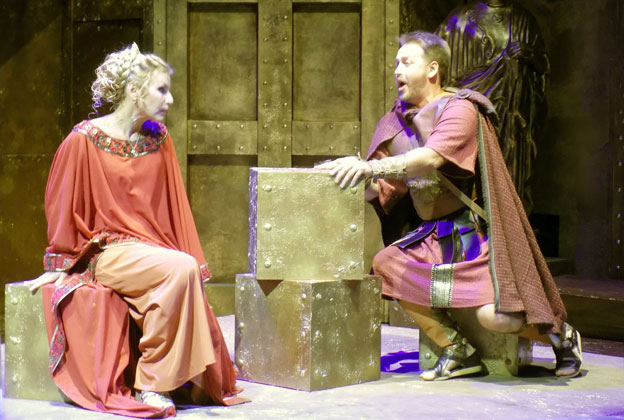
***
Opera makes an impression. It is notable that the audience was heterogeneous – but no one left after the first act, nor the second. The applause did not cease for a second and not a single actor was deprived of them.
Next performances of “Servilia” opera of N. Rimsky-Korsakov will be held on November 26, 27 and 29, 2016.
